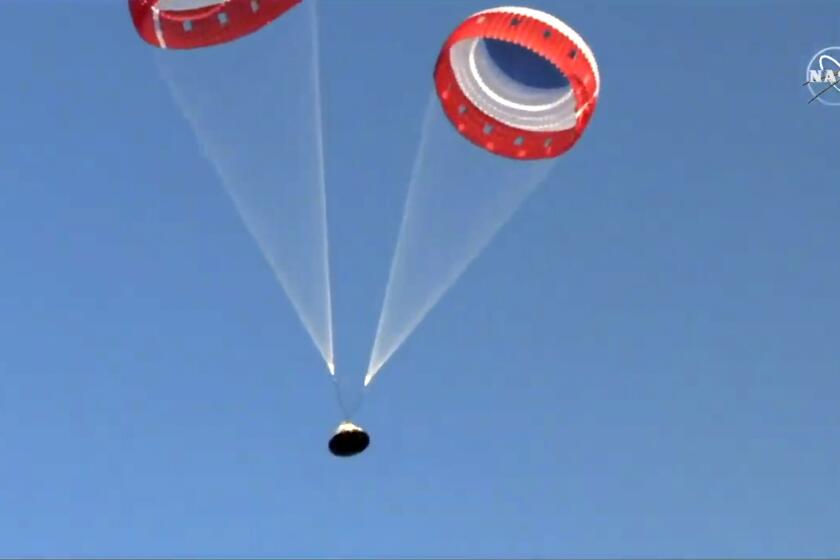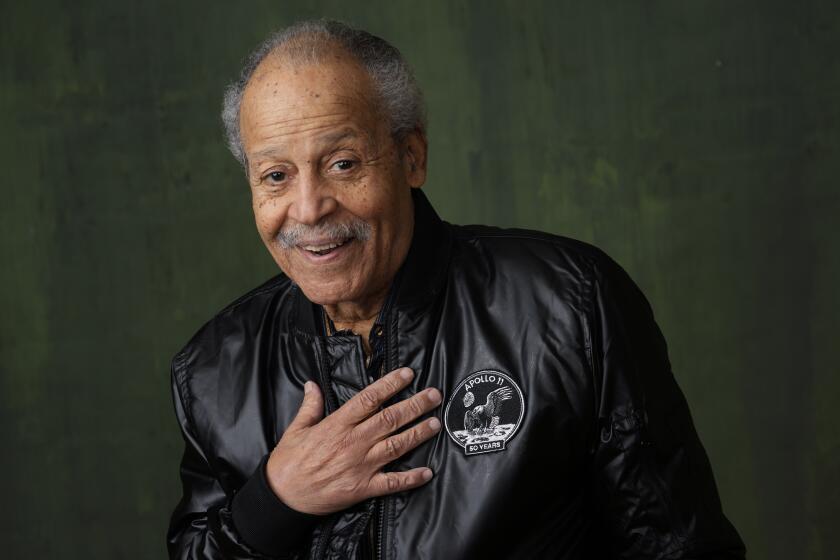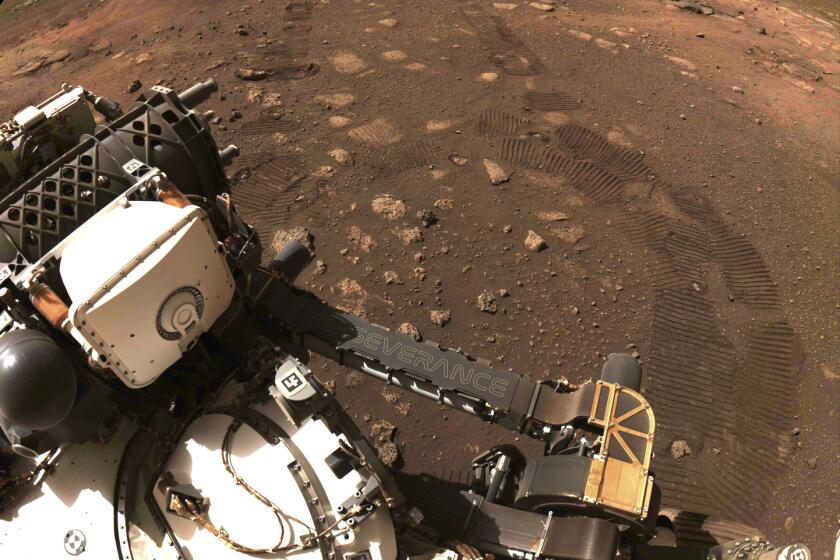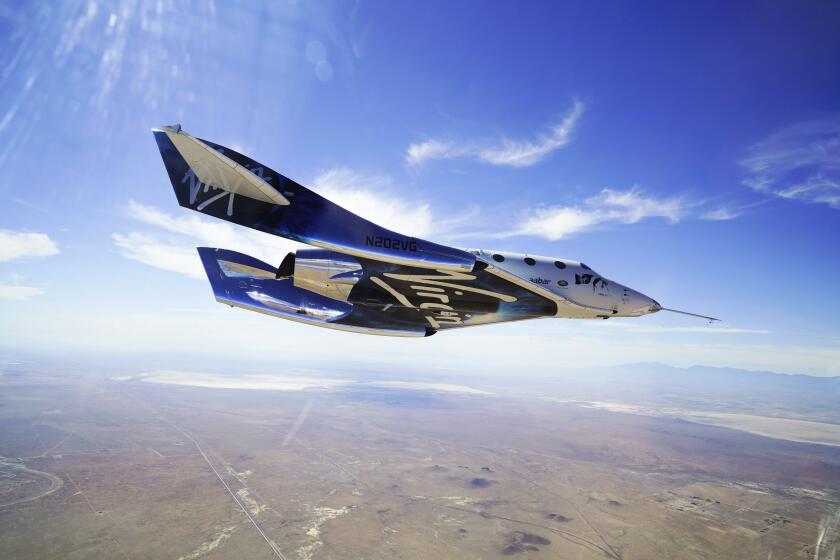Commentary: Marooned on the space station — a dream or a nightmare?

- Share via
We all get stuck somewhere sometimes when we’re traveling. In an airport overnight when your flight is canceled. Out of town when your car breaks down.
But how many people have been stuck in quite the harrowing way U.S. astronauts Suni Williams and Butch Wilmore have? Not lost in space. Trapped in one place in space. They were launched in early June on a Boeing Starliner from Cape Canaveral, Fla., to the International Space Station on a mission to test the new vehicle. Well, it turns out, the ship has some problems — mainly with the thrusters that help maneuver and propel it.
Butch Wilmore and Suni Williams spent July 4 aboard the International Space Station as NASA and Boeing officials try to figure out what’s wrong with Starliner’s thrusters.
A trip expected to take about a week has now become a two-month stay — with no firm end in sight. There is no Pep Boys in space. So the astronauts wait. It’s up to NASA engineers, in consultation with other astronauts and scientists, to decide whether the Starliner is safe enough to carry Butch and Suni — as NASA officials refer to them — home. NASA officials said they would make that decision after a final review in roughly a week.
If they decide it is too dangerous, the two won’t get back to Earth until they can hitch a ride on a SpaceX Crew Dragon ship that is scheduled to arrive in September with two astronauts. But those two won’t be done with their mission and ready to go back to Earth until about February.
Butch and Suni’s eight-day trip will have expanded into an eight-month sojourn.
Ed Dwight was an Air Force pilot when President John F. Kennedy championed him as a candidate for NASA’s early astronaut corps, but he wasn’t picked.
How do you plan to go somewhere for eight days, then realize you’re there for eight months? They didn’t pack enough clothes. They left behind spouses and dogs and hobbies.
As someone who doesn’t even like to get in elevators for eight seconds, I cannot imagine the claustrophobia of a space station for eight months — although from end to end it is nearly a football field long and, according to NASA, the living and working space is bigger than a six-bedroom house. A lot of that is divided into modules and research labs. It does not look as spacious as the Starship Enterprise.
Butch and Suni joined a crew of seven astronauts — Expedition 71 — already at the station who have dibs on what passes for the best sleeping accommodations — phone-booth-sized compartments attached to interior walls so sleepers won’t float away in microgravity.
The dazzling first images from the James Webb Space Telescope are the latest in a gradual but continually improving understanding of the universe, like the newfound clarity you find when you leave the light-polluted vistas and view a starry night under a truly dark sky.
Suni sleeps in a makeshift bed in a lab, and Butch has a sleeping bag in another lab that he secures in place while he sleeps at night — or multiple nights. The space station orbits the Earth 16 times a day, so that’s a lot of sunrising and sunsetting in one eight-hour period.
Sort of like bunking on your sister-in-law’s couch at Christmastime. But for half a year?
At least they can finally get fresh clothes. A resupply ship carrying 8,200 tons of food, fuel and supplies arrived early this month, and another one, stocked with nearly three tons of cargo, is expected to dock on Saturday. So they do have DoorDash, kind of, in space.
Bringing back samples from the Red Planet would help us beat the Chinese, send humans into space and learn about how planets form. Congress, where’s the money?
Oh — and there’s a gym where they spend hours a day on a treadmill, bike and weightlifting system countering loss of bone and muscle mass in microgravity.
For those of us on Earth, traveling in space may seem like a respite from the stress — warfare, political strife and global warming — of planet Earth.
But then something happens to remind us of the stress up there too — as well as the danger.
If being marooned in space while people on Earth decide whether the vehicle you rode in on will get you safely back home — or whether you need to wait half a year for another spacecraft — is unnerving, the astronauts didn’t show it in a July news conference they gave from the space station.
The final frontier, where “no man had gone before,” could soon become the playground of the rich and daring. That comes as no surprise.
Of course, Butch and Suni are not ordinary Earthlings. They are former Navy test pilots and NASA space station veterans. Suni also spent nine days living in a NASA underwater research lab.
“I reiterate this is a test flight and we were expecting to find some things, and so we are finding stuff and we are correcting it,” said Suni, who added that she and Butch integrated into the crew stationed there right away, helping them with science experiments and “some major maintenance that has been waiting for a while. There was the urine processing pump.”
Did the crew wait for the new guys to show up and make them fix the urine pump? That’s a little harsh.
When they finally travel back to Earth safely and successfully, we hope they get a vacation where they can sleep on beds that don’t float around unless they’re strapped to something, eat food that isn’t shipped by the ton, and know that, whenever they want, they can return home.
More to Read
A cure for the common opinion
Get thought-provoking perspectives with our weekly newsletter.
You may occasionally receive promotional content from the Los Angeles Times.















